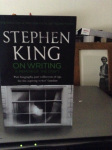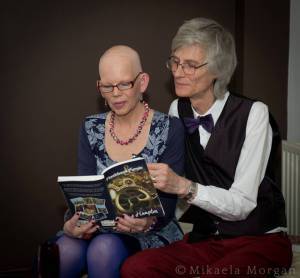Ruth F. Hunt's Blog, page 5
April 1, 2016
Pray God You Can Cope…
I have been going downhill since December and 4/5 weeks ago I asked my GP to help. First problem was my usual GP had retired.
The new GP sent an urgent fax, letter and phone calls. Eventually it appeared I was getting the support I needed, with a visit from someone from the Complex Care Team with promise of a consultant appointment.
However, this is where it stalled. My regular psychiatrist is off, they have only this week got a locum. With a backlog of patients needing to be seen, my case hasn’t even been discussed with him, and he may advise I don’t need to be given an appointment (!). If he does agree to see me it could be weeks and weeks before it takes place.
Naturally, I’m now very concerned about the future, intrusive thoughts make more and more sense, and seem more rational than my thoughts of hanging on. If you have a severe mental illness, such as Bipolar(what I have) and you require help, pray God you can cope with the state of the services.


March 28, 2016
Advice for Aspiring Writers: What Helped You on Your Journey to be an Author?
In June, I’m going to be a professional advisor at a writing festival (Southport Writing Festival) giving 1:1 advice to aspiring authors. This is a huge honour, and so I’m compiling a pack full of resources for them that I hope will help them on their writing journey.
The pack is going to include:
Useful books (such as Stephen King: On Writing, pictured below) magazines and websites
Writing courses, degrees, retreats, writing groups and writing festivals
Editors, proofreader’s and beta readers
Routes to publication
Common problems and how to solve them

I wondered whether any of you have had writing advice that helped you on your journey to be an author? Whether a book, or a particular course helped you? Or whether you had help from an editor, proofreader or beta reader that you would like to share? I would be very grateful if you could let me know, in the comments below, or message me on Facebook or Twitter.
If you run a writing course, writing retreat or you are an editor or a proofreader and you would like your details in the pack, I would be happy to include you. Please could you could put your details on an A4 or A5 flyer so that it can be easily accessible in the pack. If you need any more details regarding this, do get in touch.


March 23, 2016
‘I claim benefit because I physically cannot work. I don’t have a choice’
RUTH HUNT talks to disabled teenager, Lydia, about the cruel and dishonest narrative the Tories are constructing about disabled people
Source: ‘I claim benefit because I physically cannot work. I don’t have a choice’


March 14, 2016
Discarded Hero (in memory of Salford George) poem published.
Last year I read a story in The Manchester Evening News, about an 82 year old homeless man ‘George’ and his ‘band of brothers’ 12 men, all homeless, all ex-army. They had been staying in a squat but were evicted. Days later George became ill. The men all walked with George to Salford Royal Hospital, where George died.
This had a big impact on me.
 I produced a sonnet, as I felt the relationship between these men was of a true, loving friendship. As I was writing it, I felt it might suit The Big Issue, and today it was published. When I was 30 I was homeless for over two years, so I already had an interest in the subject and support the work of this fine magazine.
I produced a sonnet, as I felt the relationship between these men was of a true, loving friendship. As I was writing it, I felt it might suit The Big Issue, and today it was published. When I was 30 I was homeless for over two years, so I already had an interest in the subject and support the work of this fine magazine.


March 8, 2016
Creatives with a Mental Health Connection.
On my Twitter profile you may have noticed that along with being an author and a columnist I am now also doing interviews for GFT Press.
The first of these interviews will appear in April with more in the pipeline to follow.
The people who I’m interested in interviewing, must be involved in the creative arts – as a writer or visual artist, or both! The second ingredient is there must be a mental health connection.
Does this describe you? Would you like the opportunity to showcase your work, and talk about why your work has or why you have a mental health connection?
I won’t be able to say yes to everyone, but if you are interested do get in touch in the comments box below.
If you are on Twitter follow GFT Press at @GFTPressLLC and have a look at the website http://www.GFTPress.com


March 7, 2016
Able Magazine Review of The Single Feather and Giveaway.
Was so good to see an excellent review of TSF in Able Magazine – currently the consumer specialist magazine of the year. This mag can be found in hospitals, rehab centres as well as on sale or by subscription. If you have a disability there is always something in here of use.
PS. As you will see there is a giveaway here!!


March 2, 2016
Joblessness branded a ‘mental illness’
Forcing the unemployed to undergo therapies they don’t want or blaming their attitude for their plight is totally unethical, write RUTH HUNT and LINDA GASK
Source: Joblessness branded a ‘mental illness’


March 1, 2016
I Know you Have a Little Life in You Yet…
What a time to be depressed, when mental health services are so damaged by cuts, but that’s where I’m at. I have bipolar, and was probably a little hypo last summer, not full blown manic just a lot more energy than usual. Then around Christmas came the huge drop, that’s left me unable to leave my house, and storing up lethal drugs. I don’t want to be like this, who does? So I sought help. Let me be clear one in four of us has mental health problems and there is NOTHING to be ashamed about asking for help.
The doctor came, and is faxing mental health services for input and advice. I looked into her eyes and raised an eyebrow. I know, I will keep on at them until I get a reply, she said. I didn’t have to say anything.
She has asked me to ring her if things get worse, and for a brief moment I imagined absolutely nothing happening. No response from mental health services, no action on my tablets and me steadily getting worse. I had to push those feelings to the back of my mind. I just have to hope services are not so threadbare I’m left dangling, desperately trying to hang on to life, while my illness waves a pair of scissors in front of me, willing me to cut myself free from it all.
So, please be patient with me, I WILL be better soon.
If you experience depression, feelings of hopelessness or worthlessness, please contact your GP or Samaritans and speak to friends and family about you are feeling.


January 28, 2016
Sanctions in overdrive
RUTH HUNT speaks to three sanctions survivors who, thanks to Iain Duncan Smith’s merciless regime, were left for weeks with as little as £5 to get by on
Source: Sanctions in overdrive


January 25, 2016
Guest Writer – Leslie Tate
Today, it is my pleasure to welcome Leslie Tate to the blog to talk about his books and writing life.
CAN YOU TELL ME ABOUT YOURSELF AND YOUR BOOKS
In my 60s novel Purple http://leslietate.com/shop/purple/ the book’s protagonist Matthew, ‘warehouses’ his experience, storing up impressions for future use as an author. In a similar way, when I was a London teacher, I kept promising to sit down and write my novel. I imagined that one day a storyline would suggest itself and the words would flow, all I had to do was wait for the crucial lightbulb moment. It wasn’t until the 80s when I studied a Creative Writing MA at Goldsmiths’ College, that I realised inspiration from above wasn’t going to happen. By reading the biographies of several writers I discovered that lyrical, flowing pieces were often the result of slow, patient, line-by-line work, going on for weeks or years, It helped me get over the feeling that if I was a writer ut had to come naturally or not at all, and so I schooled myself to the business of endless revision. Since late childhood I’d admired poetry fonts original, figurative expression and unusual points of view, I was a dreamy, romantic boy who took himself off on long country walks, reciting Wordsworth and trying self-consciously to enter the ‘poetic world’. Later as a teacher, I lasted out the working week, ,marking and preparing all Saturday in order to leave time for writing a few lines of poetry in Sundays, The job and having children drained me, progress was slow and a single poem might take me three months, but at least I was keeping my hand in. In 2006, I met my wife, Sue Hampton and read her books http://www.suehamptonauthor.co.uk/product/flashback-and-purple/ Understanding her writing. which has a classic feel showed me how the extended prose line is more tied together by meaning than poetry, But I knew from poetry that sound makes absolute sense, so I sill test for rhythm and cadence, reading ‘out loud in my head’ when I revise. I’ve always admired poets who stretch the language. I immersed myself in classic poets and authors such as Lowell, Hughes, Woolf and Lawrence, trying to build an individual voice. Reading American novels such as Carol Shields, Marilynne Robinson and Anne Tyler has pushed me towards a blend of literary and the conversational, and I’ve written two novels in that style then started a third before attending a University of East Anglia Masterclass in 2014, I write about modern love from tentative awkward first dates ti passional late-life romance. I want to communicate how it feels to be thoughtful and maybe at odds with society and at the same time involved in an intense, challenging love affair or a mistaken marriage, I want to ‘look inside the book’ and show how the relationships we see all around us have changed during the 20th Century but as an imaginative act rather than a historical investigation.
2) ARE YOU A PLANNER OR A DISCOVERY WRITER?
The characters and the words I use shape my books. I don’t have a plot in mind, other than a general feel for the people and places I’m portraying. I head straight into the highs and lows of personal experience because I want to show people from the inside, as they are when they’re not ‘presenting’, stripped of inhibition. Of course I know that a novel can only show a fragment if who we are so I try to steer the book into challenging and deeply felt incidents I’ve experienced in order to get to the quick of things. But the books usually get the better of me and lead me into episodes that are equally challenging but belong to the story, rather than to me. I often feel like an escape artist when I’m writing because my characters get themselves into fixes which don’t seem to offer any easy way out. Fortunately, something usually comes to my rescue – a symbolic object, a key remark or a setting comes up where something decisive can happen. If it doesn’t then I have to scrub that part of the book and start again. If a scene does come together, I often find myself going back and writing in pointers to the new element that is going to change the story.
4) DO YOU FEEL THE WRITER/AUTHOR HAS SOCIAL RESPONSIBILITIES?
I feel a responsibility to the English language, so I aim to write something which grows out of the tradition while trying out new areas if expression. I have to tell myself that ”best selling’ is no guide to quality, To keep writing well without significant recognition I carry out a deliberate double-take when I’m editing, I allow part of me to admire and enjoy the expressive flow, while another part comes down hard on all the flaws and blemishes, I’m resigned to the idea I may have worked for years in vain. All I can do is keep in touch with the world’s greatest writing and try to measure up, While most books published are deliberately dumbed-down, much acclaimed contemporary fiction sets out to dazzle, It’s often brilliantly savage but ultimately dry and academic. I do believe that the discourse of novels contributes to there openness or closed-offness if an era and that our imaginations are currently limited by the post-modern and neo-liberal consensus. In my own small way, I dream of changing that.
5) CAN YOU TELL ME ABOUT YOUR CURRENT BOOK?
Purple http://leslietate.com/shop/purple/ is the first in a trilogy. It begins with Matthew Lavender’s coming-of-age story, going up to university in 1969 and dating women while hiding his sexual naiveté behind a mask of wildness, His story alternates with his gran Nary describing her harsh 1920s upbringing, Mary’s story offers clues as to why Matthew and his parents are the way they are. The two protagonists come together at the end. Matthew’s section is deep and lyrical. describing the up-and-down, chaotic and posey business of attraction and repulsion, between fired up young people. It’s also wildly comic when he escapes to a 60s style commune. But I’ve made sure it’s true to life and not full of hype or nostalgia. Mary’s section is direct and shocking, showing family conflict and rebellion. Her upbringing is intensely individualistic, a theme which runs through thr book. But Mary is a warm, likeable characters an accommodator who sees and shares things which go deep, In both stories I’ve tried to create a fully rounded characters who change and develop as a result of what they go through.
5) IF YOU COULD PASS ONE PIECE OF ADVICE INTO A BUDDING WRITER, WHAT WOULD IT BE?
Don’t chase the market but study the literary tradition and write from the soul, using character and language as your guide.







